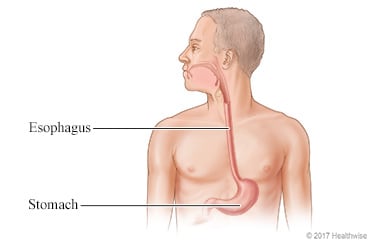
What is it?
Esophageal cancer is the growth of abnormal cells in your esophagus. That's the hollow tube that connects your throat to your stomach. The cancer most often starts in the cells that line the inside of the esophagus.
What are the symptoms?
Symptoms of this type of cancer can include:
- Trouble swallowing.
- Feeling like there's something stuck in your throat.
- Pain when you swallow.
- Weight loss.
- Pain behind your breastbone (sternum).
- Hoarseness and coughing.
- Stomach upset (indigestion) and heartburn.
How is it diagnosed?
Your doctor will ask you questions about your and your family's past health. He or she will do a physical exam.
Your doctor likely will do an endoscopy. This is a test that lets your doctor look at the inside of your esophagus. The doctor uses a thin, lighted tube (endoscope) that bends. He or she uses it to look at your stomach and the first part of your small intestine. The doctor can also use the scope to take a sample of tissue for study (a biopsy).
You may need more tests. These tests may include a CT scan, a PET scan, or an ultrasound of your esophagus.
How is it treated?
Treatment for esophageal cancer is based on the stage of the cancer and other things, such as your overall health. The main treatment options include:
- Endoscopic treatment.
-
For early cancer, the doctor may use an endoscope to guide tools down your throat. The tools are used to remove or destroy the cancer.
- Surgery.
-
For cancer deeper in the tissue, you may have surgery to remove part of the esophagus.
- Radiation therapy.
-
This uses high-dose X-rays to destroy cancer cells and shrink tumors.
- Chemotherapy.
-
These medicines kill fast-growing cells, including cancer cells and some normal cells. Chemotherapy and radiation may be given together. This is called chemoradiation.
In some cases, targeted therapy or immunotherapy may be an option. A clinical trial may be a good choice.
Your doctor will talk with you about your options and then make a treatment plan.
What are some other things to think about?
- Some tumors are aggressive and need treatment right away. But most cancer grows slowly enough that you can take a little time to find out more about your cancer as you decide about treatment.
- Think about getting a second opinion from another doctor. Before you start major treatment, it's a good idea to check with another doctor about the type of cancer you have and the stage of your cancer. Your doctor or insurance company can recommend someone for a second opinion.
- Ask any questions you might have. You can talk to your doctor, nurses, counselors, and other advisors.
- Talk to family, friends, and supporters. Get the kinds of help you need.
Current as of: October 25, 2024
Author: Ignite Healthwise, LLC Staff
Clinical Review Board
All Ignite Healthwise, LLC education is reviewed by a team that includes physicians, nurses, advanced practitioners, registered dieticians, and other healthcare professionals.

